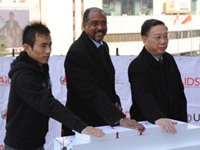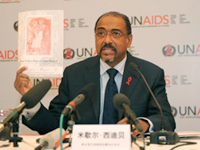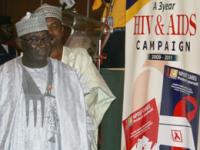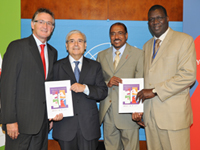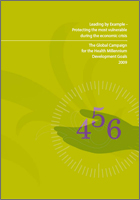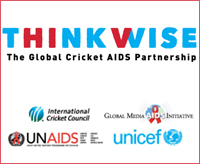
ITU TELECOM WORLD 2009 welcomes Youth Forum participants.
Credit: ITU / F. Rouzioux
Digital and technological revolutions have dramatically changed the way in which people communicate around the world. Many communities in developing countries don’t yet have access to computers and the internet however according to the International Telecommunications Union (ITU) an estimated 2.2 billion mobile phone users lived in developing countries by end 2008 – 64% of the global market. Estimates show that by 2012, half of all individuals in remote areas of the world, who often do not have access to clean running water, electricity or the Internet, will have mobile phones.
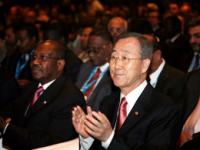
H.E. Mr Ban Ki-Moon, UN Secretary-General and Dr Hamadoun Touré Secretary General of the International Telecommunication Union (ITU) observing the vibrant Opening Ceremony of TELECOM 2009
Credit: ITU / F. Rouzioux
The ITU is gathering the global telecommunications sector together in Geneva this week for Telecom WORLD 2009. The United Nations Secretary-General Ban Ki-moon opened the conference on 5 October. Delegates will explore areas of societal change including the digital divide, climate change, and disaster relief. With its focus on development opportunities, the event brings together corporate social responsibility and displays cases of best practices.
The explosion of mobile technology presents a great opportunity to scale up the AIDS response in poor countries.
UNAIDS Executive Director Michel Sidibé is convinced of the value of this approach. “Communication tools are reaching more and more people even in the most remote villages. They connect us all into a global community,” he said.
Harnessing technology in creative ways will help us reach people in need. I want universal access to HIV prevention, treatment, care and support services to be as ubiquitous as mobile phone coverage.
UNAIDS Executive Director Michel Sidibé
“Harnessing technology in creative ways will help us reach people in need. I want universal access to HIV prevention, treatment, care and support services to be as ubiquitous as mobile phone coverage,” Mr Sidibé continued.
Mobile technologies and the AIDS response
Through mobile technology, the millions of people in developing countries who had been left behind by the digital divide are now able to access health information and healthcare services at their fingertips. Mobile phones are being used as low-cost tools for HIV testing, data collection, epidemic tracking, and training of health workers, HIV prevention and treatment support.
Some innovative examples include the HIV awareness and testing campaign via SMS (“Text to Change”, Uganda); HIV testing and treatment support with mobile phones (“Project Masiluleke”, South Africa); strengthening health systems via mobile phones (“Phones for Health”, Rwanda); and smart cards to monitor HIV patients (India and Zambia). These are a small part of the growing field of mHealth, whereby mobile communications, such as mobile phones and portable digital assistants (PDAs), are used for health services and information. mHealth programmes are gaining prominence in regions worldwide.
SMS messages can help change behaviour
Short message service (SMS) messages now offer a cost-effective, and efficient method of disseminating health messages in developing countries. According to the UN Foundation report mHealth for Development: The Opportunity of Mobile Technology for Healthcare in the Developing World, formal studies and anecdotal evidence demonstrate that SMS alerts have a greater impact in influencing behaviour than radio and television campaigns.
SMS alerts are also relatively unobtrusive, offering the user confidentiality in environments where HIV is often taboo. In developing countries, SMS alerts have proven highly effective in targeting hard-to-reach populations in rural areas, where the absence of clinics, lack of healthcare workers and limited access to health information often prevent people from making informed decisions about their health.
SMS campaigns on HIV testing and treatment support
A growing number of countries, largely in Africa, are partnering with local mobile phone carriers to launch HIV awareness and testing campaigns via SMS. These campaigns have been particularly effective in providing young people with the facts about HIV and encouraging them to get tested. Mobile phones have also been used to encourage people living with HIV to take their medication and go to their medical appointments. Taking HIV medication regularly is crucial to avoiding drug resistance.
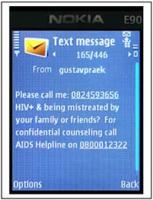
Project Masiluleke uses mobile technology to encourage South Africans to get tested for HIV. It sends one million “Please call me” text messages each day throughout South Africa, encouraging people to get tested and treated for HIV. The SMS messages are written in local languages, and are used to direct users to the National AIDS Helpline. Once patients call, the hotline representatives provide information on HIV testing services and locations. Knowing one’s HIV status is critical in a country where almost 20% of the population is living with HIV, but less than 3% know their status.
Using mobile technology for diagnosis and data collection
Health workers in remote areas with no health facilities are now able to diagnose and provide treatment support to people living with HIV through wireless access to medical information databases or medical staff. As a result, patients are able to receive treatment in their villages and homes.
Furthermore, data collection from remote areas is much faster, reliable and more efficient through mobile technology. Innovative initiatives such as “Phones for Health” are helping to close the information gap that exists for patient data in developing countries, allowing decision-makers to make smarter investments by allocating resources where they are needed most. Data collection is a crucial component of HIV programmes in developing countries as policymakers and health providers at the national, district and community level need accurate data to determine the effectiveness of existing programmes and shape new policies.
GIS mapping to strengthen HIV programmes
WHO in collaboration with its partners is strengthening HIV surveillance, prevention and treatment programmes in countries by using a global information and mapping system compiled through remote field data collection tools, wireless applications and satellite systems. This allows WHO to monitor and analyze the epidemiological trends in HIV infection worldwide as well as the effectiveness of HIV prevention and treatment programmes. For example, the data collected through the mapping system can help health experts determine which health centres have sufficient stock of antiretrovirals (ARVs).
Web-based technology to fight HIV
In addition to mobile technology, web-based technology is also revolutionizing the way health information is disseminated across the globe. A large proportion of people worldwide are now able to access information about HIV transmission, prevention, care and treatment with the click of a mouse.
When it comes to educating young people about HIV, the Joint United Nations Programme on HIV/AIDS (UNAIDS) and its Cosponsors, particularly UNICEF, UNFPA and The World Bank, are using the web in innovative ways to disseminate messages about HIV prevention.
In 1998, UNAIDS and UNICEF partnered with MTV to launch the award-winning Staying Alive campaign. Ten years later, it has become the world’s largest, youth-focused, HIV prevention campaign. UNICEF’s Voices of Youth website offers young people a safe and supportive space where they can explore, discuss and partner on health, development and human rights issues, including ways to stop the spread of HIV.
Tapping into viral communication trends
Social media networks such as Facebook, MySpace, and Twitter are gaining popularity worldwide. These examples of viral communication encourage greater interactivity whereby information is disseminated more broadly and quickly. This trend is accelerating the pace at which information is communicated, and its potential to reach new audiences with precise and tailored messages is impressive.
Like many organizations, UNAIDS is increasing its use of social media networks to get its messages out to new and existing audiences. UNAIDS has a presence on both Facebook and Twitter and engages with the sites’ users by posting regular updates and encouraging user comments and feedback. Content-sharing sites like Flickr and YouTube also enable UNAIDS to share its audiovisual content to people worldwide.
The aim of using social media networks is simple: to disseminate messages about HIV and encourage young people to take action to stop the spread of HIV.
Looking ahead
As new technologies continue to evolve, so will the way in which countries respond to HIV. By staying on top of emerging technology trends, countries will be able to use innovative tools to provide people, even in the most remote villages, with access to HIV prevention and treatment services.







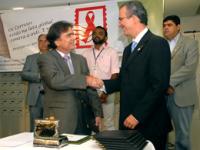

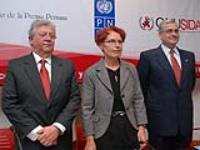 Luis Agois President of the Peruvian Press Council, Renate Ehmer, UNAIDS Coordinator for Peru, Ecuador and Bolivia and Jorge Chediek, Resident Representative of the UN system at the launch of the new campaign.
Luis Agois President of the Peruvian Press Council, Renate Ehmer, UNAIDS Coordinator for Peru, Ecuador and Bolivia and Jorge Chediek, Resident Representative of the UN system at the launch of the new campaign. 